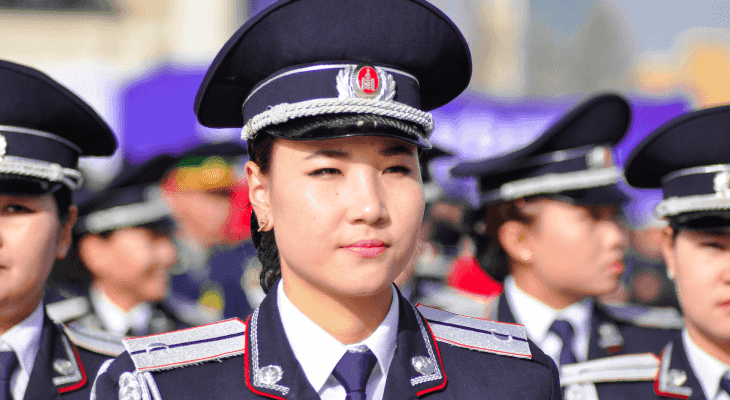10 Ways Girls Couldn't (and Still Can't) Run the World
Women in the past had it rough, but have things really changed for the better today? Here are 10 laws that affected women throughout history.
Updated 17 Apr 2018

The inimitable R&B legend Beyoncé once sang, “Who run the world? Girls!” — and this iconic anthem isn’t just based on feminist optimism.
Women have played a pivotal role in history with incredible contributions to science, technology and a slew of other fields that have made our lives tenfold easier today. But this was by no means an easy feat. For years, they have had to overcome numerous different systemic challenges that prevented them from reaching their true potential.
In this article, we’re highlighting some of the jobs that women couldn’t do in the past and some of the crazy and stifling laws that are still the reality for some working women across the world today.
#1. Women were discouraged from becoming lawyers

Like most professions, women were only allowed to practise law long after their male counterparts.
While one of the pioneer women lawyers, an American named Arabella Mansfield, was admitted to the bar in 1869, the fraternity was still rife with sexism even until late into the 20th century. In the 1920s, women were turned down from law firms, simply for being women, even though they ranked equal or better than the men.
Even former U.S. Secretary of State Hillary Clinton details her experience during a Harvard Law admissions test where the men in the room jeered at the women for being less worthy to take the exam.
#2. Married women were not allowed to teach in the 1920s

If you haven’t noticed, about 90% of teachers in Malaysia are made up of women. Not only do they dominate the teaching profession in our homeland, but many reports also suggest that they lead the pack in other parts of the world too!
But this wasn’t always the case. In the 1920s, married women were not allowed to teach in Wales. And if female teachers got married during the course of their profession, they were sacked! They either had to get married in secret and then live apart from their husbands or put the relationship on hold indefinitely.
Relationships are tough as it is, but it looks like balancing a career and love life was doubly hard back in the day!
#3. Female doctors were frowned upon back in the day

Although women were considered to be natural healers and experts in midwifery for centuries, they found it difficult to reach the ranks of men in the medical profession in many countries around the world without public disapproval.
Take the incredible story of Dr James Barry — renowned military surgeon, inspector general of hospitals (a very big deal at the time) and later revealed to be the United Kingdom’s (UK) first ever female doctor.
Yes, that’s not a typo! This resilient medical genius masqueraded as a man throughout her career just so she could practise in peace, right under the nose of prestigious institutions like Edinburgh University, the Royal College of Surgeons and the British Army.

#4. Ladies aren’t allowed on the front lines of the army

This may hardly come as a surprise, but women were not allowed to join the army in most countries until World War I.
For many years prior, women were relegated to tasks such as cooking and clerical work, despite having led and won rebellions since the 3rd Century and surreptitiously fighting in a number of world wars dressed as men!
The disparity between the roles of men and women in the military are still apparent today, with countries such as Turkey and Slovakia banning women from serving in front line combat roles.
#5. Women are subjected to weird manufacturing laws

In the United Arab Emirates (UAE), women are prohibited from manufacturing a host of different materials and are not allowed to monitor, repair or clean mechanical machines.
In the region, women are also not allowed to work without the consent of their husbands, nor are they allowed to work at night (between 10pm and 7am). Other oddly specific occupational restrictions include prohibiting women from engaging in jobs that require “flaying, chopping and depilating animals and melting their fats".
Apply for university with EduAdvisor
Secure scholarships and more when you apply to any of our 100+ partner universities.
Start now#6. Girls aren’t allowed to study mining engineering

In China, national labour laws suggest that mining work is unsuitable for women, which would mean excluding almost half of the entire population from a wide variety of jobs such as mining engineering, tunnelling engineering and navigation — otherwise known as “green card majors” or courses that guarantee a job upon graduation.
In fact, the country’s prestigious Mining and Technology University in Jiangsu prohibits women from applying for their programmes because some jobs are “inappropriate” for women and that they “should not waste energy that can be better used elsewhere".
#7. Women aren’t allowed to control transport

In Russia, women are prevented from employment in a variety of jobs in the transport industry, ranging from ship captain to driver of a bus with more than 14 seats. Take for instance Svetlana Medvedeva who fought tirelessly to achieve her dream to become a ship captain after graduating as a navigation officer, only to have her offer retracted due to sexist labour laws in the country.
In fact, Russia was crowned “the country with the most job-related barriers” by the United Nations in 2016 and rightly so as it prevents women from engaging in a whopping 456 jobs across 38 industries.
#8. Girls aren’t allowed to distribute leaflets

Despite being a seemingly harmless way to earn some extra cash in most parts of the world, it is illegal for women in Madagascar to prepare, handle or sell any form of printed literature, posters, drawings, engravings, paintings, emblems and images as such forms of work are considered to be “contrary to morality” according to a report by the World Bank.
On top of that, women in Madagascar are also not allowed to work at night, regardless of whether the work is public, private, secular or religious. Yikes.
#9. Women cannot get a passport without the permission of a male guardian

Saudi Arabia’s King Salman may have lifted the driving ban on Saudi women, but many are still unable to do a host of other things without the permission of a male guardian (typically a father, brother, uncle or husband).
This includes travelling, obtaining a passport, getting married or divorced, as well as signing contracts. They are also usually not allowed to leave home alone.

#10. Some women can’t choose their own professions

In countries like Guinea, women are not entitled to have jobs that are different from their husbands if it is in the “best interests” of the family.
This is also similar in Cameroon where a husband can object to his wife’s choice of occupation if he feels it is in the best interest of their marriage or children.
There’s no doubt that we’ve come a long way from the olden days, but we’ve got lots more work to do to ensure equal opportunities for our women and girls.
Like some of the strong and undefeatable women in history who have paved the way for the future, we hope you’re inspired to defy the odds and reach for the stars. In the wise words of Shirley Chisholm, the first African-American congresswoman of the United States of America:
If they don’t give you a seat at the table, bring a folding chair. — Shirley Chisholm






